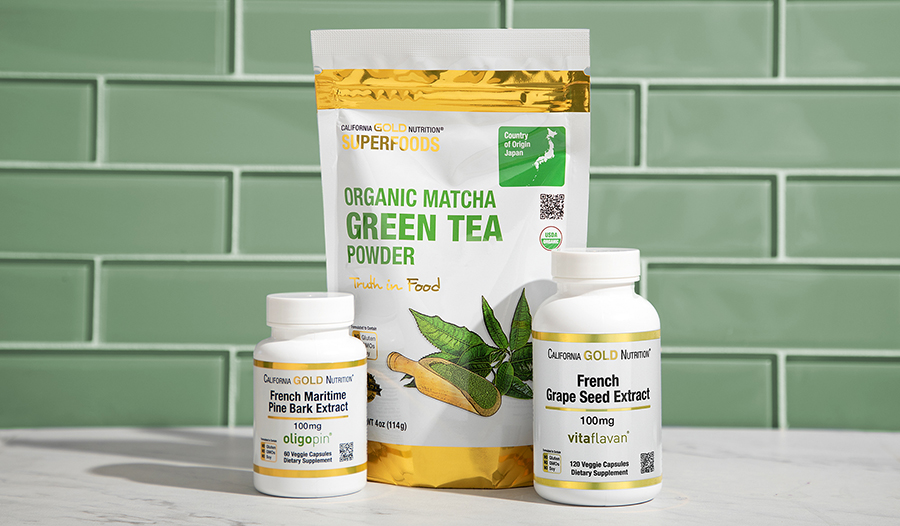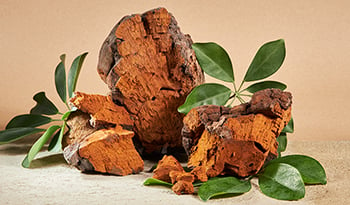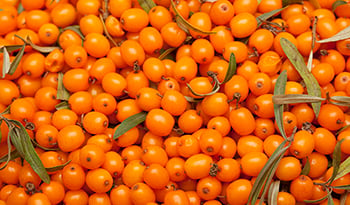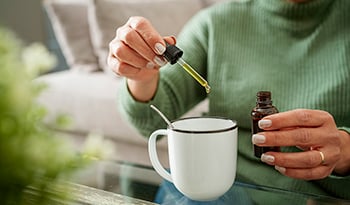3 Polyphenols + Their Benefits: Green Tea, Grape Seed, Pine Bark Extract

What Are Polyphenols?
Polyphenols are a broad class of naturally occurring compounds found in plants, known for their antioxidant, anti-inflammatory, and health-promoting properties. The flavonoids are the largest and most studied subgroup of polyphenols, accounting for about 60% of all polyphenols in the diet.
Green tea extract (GTE), grape seed extract (GSE), and pine bark extract (PBE) are the most popular polyphenol extracts.
Health Benefits Of Polyphenols
Polyphenol extracts have shown significant clinical benefits in supporting health. Most of the research has focused on the following areas:
- Antioxidant and anti-aging effects
- Eye health and visual function
- Focus, attention, cognitive function, and brain health
- Gum and periodontal health
- Heart and vascular health, including blood pressure regulation and the health of arteries, veins, and capillaries
- Immune function
- Joint and connective tissue health
- Metabolic health and weight management
- Lungs, airways, and respiratory function
- Prebiotic and microbiome effects
- Skin health
The biological effects of green tea, grape seed, and pine bark extracts often target the same molecular pathways. These extracts, along with their monomers and metabolites, activate key regulators like Nrf2 (nuclear factor erythroid 2-related factor 2), which supports antioxidant responses, inflammation control, mitochondrial function, and detoxification. Nrf2 enhances cellular protection, helping cells repair damage and regulate various functions.
Since there is tremendous overlap in their health benefits, let’s look at some basic common health benefits and provide some insights on their comparative effect.
Antioxidant Protection and Effects on Inflammation
Green tea extract, grape seed extract, and pine bark extract all have excellent clinically documented benefits in improving antioxidant protection and reducing blood markers of inflammation.1-3 However, Pine bark extract is rated slightly superior when comparing results from human double-blind, placebo-controlled trials. This may be due to its higher levels of non-flavonoid polyphenols.
In regard to inflammation, C-reactive protein (CRP) is a blood marker that reflects the degree of inflammation that has been identified as an independent risk factor for heart disease and other chronic health issues. Once again, Pine bark extract shows the greatest impact in this area.4
Blood Pressure Support
Green tea extract, grape seed extract, and pine bark extract have all shown positive effects in improving blood pressure regulation. They accomplish this effect through several mechanisms:
- Antioxidant effects: Polyphenols have antioxidant properties that reduce oxidative stress, a factor contributing to high blood pressure.
- Endothelial function: Polyphenols improve the function of the endothelium (the inner lining of blood vessels) to enhance vascular health.
- Improved vascular function: Polyphenols promote improved vascular elasticity and tone.
Grape seed extract is the most extensively studied of the three for blood pressure regulation, with over 20 human clinical trials.5 In individuals with pre-hypertension or mild hypertension, grape seed extract has shown significant improvements. In a 12-week trial, 400 mg/day of grape seed extract reduced systolic blood pressure (SBP) by 13 mmHg and diastolic blood pressure (DBP) by 6.5 mmHg, with added benefits to vascular elasticity and pulse wave velocity. No significant effects were seen at 200 mg/day.6 Other studies suggest that a minimum effective dose is 300 mg/day for blood pressure support.
Green tea extract and its key polyphenol EGCG have also shown benefits. A 2015 meta-analysis of 14 human clinical trials found average reductions of 1.42 mmHg SBP and 1.25 mmHg DBP, with greater effects in those with elevated baseline BP.7 In a more recent study, 300 mg/day of EGCG for 8 weeks in obese individuals reduced SBP by 6.92 mmHg and DBP by 4.77 mmHg.8
Pine bark extract has been evaluated in at least 10 trials, typically at a dosage of 100–200 mg/day, often alongside antihypertensive medications.9 Modest BP reductions were reported. However, a newer study using 431.5 mg of polyphenols/day over 12 weeks showed stronger effects: SBP decreased by 6.46 mmHg and DBP by 3.06 mmHg in pre-hypertensive individuals.10 These results suggest higher doses (~400 mg/day) are needed for meaningful effects, though gape seed extract at that same dosage remains more effective overall.
Brain Health
Polyphenols, especially flavonoids, definitely play a role in promoting brain health and mood based upon considerable scientific investigation. In regard to the top 3 polyphenols and boosting mood, green tea extract has by far the most clinical research to support its use, with positive studies generally showing best results with higher dosages (e.g., 400 mg twice daily). Pine bark extract has shown some anti-stress effects, but neither pine bark extract nor grape seed extract has been sufficiently studied for improving positive mood scores. So, it appears Green tea extract exerts more benefits in this area of brain function.
Green tea extract also looks to be the best choice for protecting the brain against neurodegeneration. That may be due to EGCG being able to cross the blood-brain barrier while the proanthocyanidins of grape seed extract and pine bark extract do not.11
Regarding boosting mental processes and brain function, pine bark extract is by far the most clinically supported. In particular, several double-blind studies have shown improvements in attention, visual-motor coordination, and reduced oxidative stress in children with attention deficit disorders.12 Pine bark extract supplementation in adults has also shown improvements in memory, focus, mental clarity, and mental performance under stress.13,14
Grape seed extract has also shown significant benefits in boosting improved brain power in healthy older adults, and indirectly aids brain function by supporting cerebral circulation and microvascular integrity. But it has not been studied as much as Green tea extract and pine bark extract for brain effects.15
Metabolic Health and Weight Management
Green tea extract has by far the most clinical research to support its use for metabolic health and weight management compared to grape seed extract and pine bark extract. Dozens of human double-blind studies show that green tea extract can help support a weight management program. It has also been shown in these studies to promote reduced body fat percentage and improve insulin action, blood lipid profiles, and blood sugar control. Green tea extract is most effective when combined with caffeine. The typical dosage in these studies was a total green tea extract polyphenol dosage of 300–600 mg/day, with better results seen at 600 mg per day.16
Both grape seed extract and pine bark extract promote metabolic health by also improving insulin action and blood sugar control. They also reduce the oxidative stress and inflammation that can disrupt metabolic health. Their effect on weight management is minimal at best.17,18
Skin Health
All 3 top polyphenol extracts show benefits in skin health. Green tea extract is best for UV protection and reducing skin irritation. Grape seed extract is best for collagen support, restoring elasticity, reducing wrinkle depth, and supporting skin vascular structures. Pine bark extract is best for improving skin tone and hydration.1-3
Capillary Fragility, Easy Bruising, and Vein Health
For capillary fragility and easy bruising, grape seed extract is the best choice. For vein health, both grape seed extract and pine bark extract at dosages of 150 mg per day can support healthy vein structure and function. Conditions associated with poor vein structure and function include varicose veins, leg heaviness due to poor vein function, and hemorrhoids. Both grape seed extract and pine bark extract have been shown to improve venous tone, reduce leg swelling and heaviness due to poor vein function, and enhance blood flow. Pine bark extract has also been shown to be helpful for hemorrhoids and the prevention of venous insufficiency and leg swelling caused by long-haul flights. Presumably, grape seed extract would also be helpful for these venous issues. Green tea extract has very little impact in these areas.1-3,19,20
The Difference Between Green Tea, Grapeseed, and Pine Bark Extract
Green tea extract is primarily made up of catechins, like epigallocatechin gallate (EGCG). Grape seed and pine bark extracts, on the other hand, contain proanthocyanidins (PACs), which are chains of epicatechin monomers in smaller (oligomeric) or larger (polymeric) forms.
All three extracts also contain polyphenols with health benefits. Green tea and grape seed extracts primarily provide gallic acid, with grape seed extract also offering quercetin. Pine bark extract includes dihydroquercetin and various phenolic acids like caffeic, ferulic, p-coumaric, and gallic acid.
Green tea extract mainly contains free catechins, often bound to gallic acid. Grape seed extract is rich in PACs, while pine bark extract contains PACs and free phenolic acids. To ensure quality and health benefits, these extracts are standardized for polyphenol content:
- Green tea extract: 50–98% total polyphenols and/or 30–100% EGCG.
- Grape seed extract: ~95% PACs.
- Pine bark extract: 65–75% PACs.
The health benefits of these extracts are linked to their chemical differences, with bioavailability being a key factor. Green tea extract's free flavonoid monomers are absorbed much better than PACs, which are poorly absorbed. However, absorption may not fully explain PACs' health benefits. These compounds are extensively metabolized by gut microbiota into bioactive phenolic metabolites with various effects. Despite chemical differences, grape seed and pine bark extracts produce similar microbial metabolites, suggesting comparable effects on the microbiome and metabolism.
Safety
Both grape seed extract and pine bark extract have an excellent safety profile with no expected side effects, adverse drug interactions, or other issues at the recommended dosage. In regard to green tea extract, rare reports of liver toxicity have been reported at higher intakes of EGCG.21 To avoid any safety issue, it is recommended to keep the daily intake of EGCG to less than 300 mg per day or the total polyphenol intake to less than 800 mg.
Which Polyphenol Is Best For You?
The differences in the chemical composition of the top 3 polyphenol extracts produce slightly different health benefits. There is a lot of overlap, but in general, one of these three extracts may be a better choice based on a person’s needs. Here are some guidelines:
- Green tea extract may be more effective in cellular protection, particularly in the gastrointestinal tract and blood, as well as in blood sugar support and weight management.
- Grape seed extract may be more effective at supporting antioxidant defense, eye health, collagen, and connective tissue integrity in the skin, veins, and blood vessels, and helping to improve blood pressure regulation.
- Pine bark extract may exert a stronger influence on anti-inflammatory pathways, cognitive function, joint health, and endothelial (blood vessel lining) health.
References:
- Alam M, Gulzar M, Akhtar MS, et al. Epigallocatechin-3-gallate therapeutic potential in human diseases: molecular mechanisms and clinical studies. Mol Biomed. 2024 Dec 27;5(1):73.
- Foshati S, Rouhani MH, Amani R. The effect of grape seed extract supplementation on oxidative stress and inflammation: A systematic review and meta-analysis of controlled trials. Int J Clin Pract. 2021 Nov;75(11):e14469.
- Dridi W, Bordenave N. Pine Bark Phenolic Extracts, Current Uses, and Potential Food Applications: A Review. Curr Pharm Des. 2020;26(16):1866-1879.
- Nikpayam O, Rouhani MH, Pourmasoumi M, et al. The Effect of Pycnogenol Supplementation on Plasma C-Reactive Protein Concentration: a Systematic Review and Meta-Analysis. Clin Nutr Res. 2018 Apr;7(2):117-125. doi: 10.7762/cnr.2018.7.2.117. Epub 2018 Apr 16. PMID: 29713620; PMCID: PMC5921329.
- Zhang H, Liu S, Li L, et al. The impact of grape seed extract treatment on blood pressure changes: A meta-analysis of 16 randomized controlled trials. Medicine (Baltimore). 2016 Aug;95(33):e4247.
- Odai T, Terauchi M, Kato K, et al. Effects of Grape Seed Proanthocyanidin Extract on Vascular Endothelial Function in Participants with Prehypertension: A Randomized, Double-Blind, Placebo-Controlled Study. Nutrients. 2019 Nov 20;11(12):2844.
- Li G, Zhang Y, Thabane L, Mbuagbaw L, et al. Effect of green tea supplementation on blood pressure among overweight and obese adults: a systematic review and meta-analysis. J Hypertens. 2015 Feb;33(2):243-54.
- Chatree S, Sitticharoon C, Maikaew P, et al. Epigallocatechin gallate decreases plasma triglyceride, blood pressure, and serum kisspeptin in obese human subjects. Exp Biol Med (Maywood). 2021 Jan;246(2):163-176.
- Zhang Z, Tong X, Wei YL, Zhao L, Xu JY, Qin LQ. Effect of Pycnogenol Supplementation on Blood Pressure: A Systematic Review and Meta-analysis. Iran J Public Health. 2018 Jun;47(6):779-787.
- Ferguson JJA, Oldmeadow C, Bentley D, et al. Effect of a polyphenol-rich dietary supplement containing Pinus massoniana bark extract on blood pressure in healthy adults: A parallel, randomized placebo-controlled trial. Complement Ther Med. 2022 Dec;71:102896.
- Gamage E, Orr R, Travica N, et al. Polyphenols as novel interventions for depression: Exploring the efficacy, mechanisms of action, and implications for future research. Neurosci Biobehav Rev. 2023 Aug;151:105225.
- Hsu CD, Hsieh LH, Chen YL, et al. Complementary effects of pine bark extract supplementation on inattention, impulsivity, and antioxidative status in children with attention-deficit hyperactivity disorder: A double-blinded randomized placebo-controlled cross-over study. Phytother Res. 2021;35(6):3226-3235
- Luzzi R, Belcaro G, Zulli C, et al. Pycnogenol® supplementation improves cognitive function, attention and mental performance in students. Panminerva Med. 2011;53(3 Suppl 1):75-82.
- Belcaro G, Luzzi R, Dugall M, Ippolito E, Saggino A. Pycnogenol® improves cognitive function, attention, mental performance and specific professional skills in healthy professionals aged 35-55. J Neurosurg Sci. 2014;58(4):239-248.
- Li B, Cheng J, Cheng G, Zhu H, et al. The effect of grape seed procyanidins extract on cognitive function in elderly people with mild cognitive impairment: A randomized, double-blind, placebo-controlled clinical trial. Heliyon. 2023 Jun 5;9(6):e16994.
- Li X, Wang W, Hou L, et al. Does tea extract supplementation benefit metabolic syndrome and obesity? A systematic review and meta-analysis. Clin Nutr. 2020 Apr;39(4):1049-1058.
- Asbaghi O, Nazarian B, Reiner Ž, et al. The effects of grape seed extract on glycemic control, serum lipoproteins, inflammation, and body weight: A systematic review and meta-analysis of randomized controlled trials. Phytother Res. 2020 Feb;34(2):239-253.
- Mohammadi S, Fulop T, Khalil A, et al. Does supplementation with pine bark extract improve cardiometabolic risk factors? A systematic review and meta-analysis. BMC Complement Med Ther. 2025 Feb 22;25(1):71. doi: 10.1186/s12906-025-04819-9. PMID: 39987124; PMCID: PMC11847364.
- Kim SM, Joh JH, Jung IM, et al. Vitis Vinifera Seed Extract Versus Micronized Purified Flavonoid Fraction for Patients with Chronic Venous Disease: A Randomized Noninferiority Trial. Ann Vasc Surg. 2024 Dec;109:177-186.
- Weichmann F, Rohdewald P. Pycnogenol® French maritime pine bark extract in randomized, double-blind, placebo-controlled human clinical studies. Front Nutr. 2024 May 2;11:1389374.
- Hu J, Webster D, Cao J, Shao A. The safety of green tea and green tea extract consumption in adults - Results of a systematic review. Regul Toxicol Pharmacol. 2018;95:412-433.
DISCLAIMER:This Wellness Hub does not intend to provide diagnosis...
















































































 Table of Contents
Table of Contents















